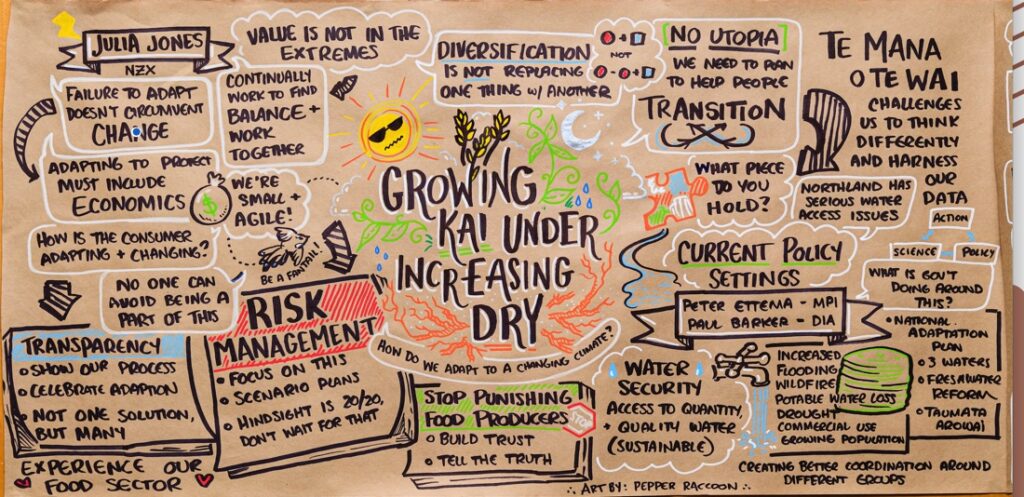Long-term planning for drought needed now – report
- AUTHORLong-term planning for drought needed now – report
- PHOTOGRAPHYMark Coote
- Thursday, November 4, 2021
Long-term planning for drought needed now – report
With COP26 underway, it’s timely to consider how, regardless of future emissions reductions, New Zealand is facing a future with more severe and longer-lasting bouts of drought.
With that in mind, we have released our report, Growing Kai Under Increasing Dry, produced in conjunction with Our Land and Water and Resilience to Nature’s Challenges National Science Challenge.
The report holds insights from a series of online webinars and a one-day symposium which brought together farmers, growers, industry bodies, researchers and government to discuss how the primary sector can adapt to drought and other severe weather events caused by climate change.
Some interesting insights from the report are:
- The directors of the three National Science Challenges co-signed a clear message to the primary sector that planning to adapt to intensifying drought conditions must start now, led by regional councils, industry bodies and central government.
- If this planning doesn’t start now, farmers and growers may become trapped into land uses that no longer suit the environment, increasing pressure on already vulnerable rural communities.
- Farmers and growers are already making incremental changes to how they use their land to adapt to climate change but must be better supported.
- The economic cost of drought is large, with sheep and beef farm profits expected to halve by the end of the century.
- Our primary export market needs to be protected but we are in a strong position to evolve and adapt.
Change is hard – messy in the middle, beautiful in the end.
Fraser Avery, Marlborough farmer
A national long-term climate change adaptation strategy that supports farmer resilience is needed to reduce the economic risks of increasing drought, says Nick Cradock-Henry, a Manaaki Whenua Landcare Research senior researcher who presented at the events.
Research has found that between 2007 and 2017, drought cost New Zealanders around $720m – six times the figure for flood damage. Severe losses of up to 54 per cent in sheep/beef farm profits are expected by 2100.
The report calls for regional councils to undertake clear planning for likely future climate scenarios in their regions, and to engage with farmers and growers to develop a shared understanding of the scenarios’ implications for the primary sector.
Regional and local councils will also need to focus on the resilience of rural communities and the mental wellbeing of farmers, the report says.
Andrew Tait, NIWA’s Chief Scientist for Climate, Atmosphere and Hazards, presented on how by the mid-to late 2000s the entire country, except for coastal South Island, is predicted to have exacerbated drought conditions which are expected to be more extreme in the North Island and east of the South Island.

Farmers in most North Island regions can also expect to spend 10 per cent more time in drought by the middle of this century.
For fourth generation Marlborough sheep and beef farmer Fraser Avery, who spoke at the symposium, “drought isn’t a new challenge”.
He farms out at Lake Grassmere, north of Blenheim, an area prone to long, hot summers with little to no rainfall.
Despite the strain this places on his family, he has shifted his farming practices to suit the changing climate by reducing the capital stock (often breeding stock, intended to be farmed for 12 months) from 80 percent to 50 percent.
Fraser says this approach gives him the flexibility to run more stock in a good season, and less in a drought.
“If you can create as many options as possible, then you feel like you’ve got a card to play but when you’re struggling for options, you feel a lot more pressure and stress.”
The clear message from the symposium was that while farmers need to begin incremental adaptations to climate change, they must be better supported to do so. People in regional councils, industry bodies, government and science must take responsibility for developing ‘system adaptations’ like improving drought modelling, and larger, transformational adaptations such as identifying new land use opportunities.
STORYTELLING
FOR CHANGE
The Deep South Challenge has always experimented with supporting or initiating different kinds of storytelling to drive climate adaptation. These long-form magazine features allow us to weave different research projects into new patterns, helping us to see our research in different ways.